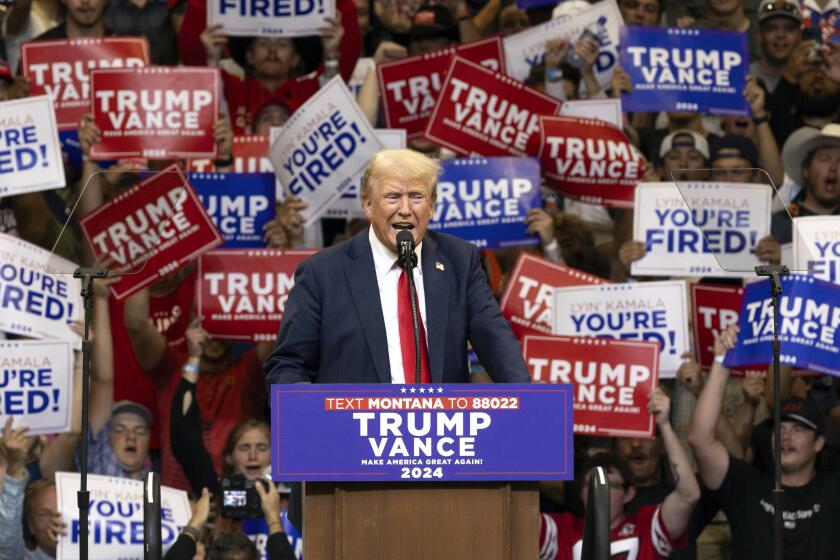Clinton Should Shelve MFN as a Weapon : China: The ‘bully pulpit’ and other pressure tactics would be more effective on human rights.
- Share via
The continuing denial of human rights in China, vividly described in a State Department report released in Washington on Tuesday, presents an increasingly serious dilemma for President Clinton. In the next few months, he must finally resolve the most important and most difficult question in America’s relations with China.
During the 1992 presidential campaign, Bill Clinton denounced President Bush for “coddling tyrants in Beijing” because Bush refused to withdraw most-favored-nation status from China. Last May, Clinton issued an executive order threatening withdrawal of MFN in June, 1994, unless the last remaining communist power made “significant progress” in respecting human rights.
According to Secretary of State Warren Christopher and senior Administration officials, the Chinese have so far failed America’s human-rights test. Indeed, if the decision were made today, they say, the President would have no choice but to withdraw MFN. What would this mean?
It would mean, almost immediately, dramatically higher prices for cost-conscious consumers, who will be surprised to learn of billions of dollars of new import taxes on goods manufactured in China.
It would also mean Chinese government retaliation against numerous American firms now seeking access to the world’s fastest-growing and third-largest economy. Billions of dollars in exports of aircraft, computers and other products could easily be lost to Japanese and European competitors, thus jeopardizing tens of thousands of high-tech American jobs.
Meanwhile, China experts argue, withdrawing MFN would seriously harm the rapidly emerging private sector in China’s coastal provinces. This emerging market economy vitally depends on exports and represents the greatest internal force for liberalization and personal freedom in Chinese society today.
However, aging reactionaries in Beijing will consider only modest, cosmetic human-rights gestures to keep MFN. Serious concessions that would pose a real challenge to their political authority are out of the question. Further, the Marxist old guard would seize upon MFN denial as justification for new repression at home and anti-American initiatives abroad.
Unfortunately, Clinton’s advisers have painted him into a corner. If he now keeps MFN simply by pointing to the inevitable, purely cosmetic human-rights gestures in the months ahead, such as the release of a small fraction of China’s political prisoners, he risks serious political embarrassment. A coalition of strange bedfellows--liberals committed to human rights, labor unions threatened by cheap Chinese imports and anti-communist conservatives--stand ready to condemn Clinton, as they did Bush, for caving in to dictators. Journalists and partisan critics will criticize him for reneging on yet another campaign promise. And foreign despots, following Bosnia, Somalia and Haiti, may again perceive Uncle Sam to be “backing down.”
President Clinton must now take command of this issue. Congressional Democrats used MFN effectively to embarrass President Bush for failing to express American outrage over the crackdown in Tian An Men Square. But it is sheer folly to believe that the threat of trade sanctions can force a tough-minded nationalist regime, governing an ancient, proud, enormous country lacking any democratic traditions, to give more than lip service to human rights. It is time to be honest and explicitly shelve a weapon that, if used, would only hurt the wrong parties. Brandished but unused, it only makes Clinton appear weak and hypocritical.
There are times when presidents demonstrate real leadership by explicitly changing their positions. President Clinton should announce that he will forcefully promote human rights through other, specific measures and sanctions. He should also employ the “bully pulpit,” powerfully engaged by President Reagan, to condemn political repression. And, Clinton should use his great rhetorical skill to explain why he will not threaten to withdraw trade but rather fight aggressively to expand market opportunities in China.
The path to real freedom in China over time is through its extraordinary economic opening to the West. It is time for Bill Clinton to lead America, and the Chinese people, on that journey.
More to Read
Get the L.A. Times Politics newsletter
Deeply reported insights into legislation, politics and policy from Sacramento, Washington and beyond. In your inbox twice per week.
You may occasionally receive promotional content from the Los Angeles Times.










